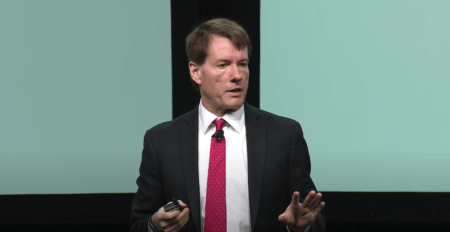On Wednesday (September 21), Stuart Alderoty, who is General Counsel at Ripple, commented on the ongoing lawsuit (against Ripple) that was initiated in December 2019 by the U.S. Securities and Exchange Commission (SEC).
Aldertoy, who has been Ripple’s General Counsel since January 2019, made his comments while speaking to CoinDesk TV’s flagship show “First Mover”.
As you may remember, on 22 December 2020, the SEC announced that it had “filed an action against Ripple Labs Inc. and two of its executives, who are also significant security holders, alleging that they raised over $1.3 billion through an unregistered, ongoing digital asset securities offering.”
Aldertoy told CoinDesk TV:
“I do believe that this policy in the United States of regulation by enforcement is a failed policy, and it’s creating havoc in the marketplace, and that havoc it in the marketplace ultimately hurts the very retail consumer that the SEC purports to protect.
“I think what we’re seeing is power and politics elevated over sound policy, and that is not a good thing. To your question, ‘why ripple?’… That is a good question. I’m not sure I have a good answer to i, but what I will tell you is that the lawsuit was filed on December 22nd 2020 on the last day of the prior administration when Jay Clayton was the chair of the SEC. The day after the lawsuit was filed, Jay Clayton left office, and within two weeks of the lawsuit being filed, the entire senior leadership team that was I think involved in the decision to file the lawsuit left the SEC.
“So why Ripple? I’m not really sure. I think we can all venture a bunch of different guesses. Maybe the SEC was tired of playing whack-a-mole with some smaller tokens, and they felt that if they could go after Ripple and indirectly attack the digital asset XRP, which Ripple relies on to facilitate its cross-border payments, maybe they thought that they can send a broader message to the entire market.
“But I think what they’ve learnt is that if you challenge a well-resourced company, that well-resourced company can put on a very robust defence and really expose the SEC that what they’re doing in this case is not applying the law. It’s not a faithful allegiance to the law. They’re seeking to remake the law, and they don’t have the power to remake the law. Only Congress can remake the law.“
On the same day, Ripple CEO Brad Garlinghouse talked to Ryan Selkis, Co-Founder and CEO at Messari, at Messari’s annual conference Mainnet (September 21-23, 2022) — in New York City — about the U.S. SEC’s lawsuit against Ripple.
With regard to the lawsuit, the Ripple CEO had this to say:
- The first time that he went to meet with the SEC, he “didn’t go with any lawyers,” because he did not even imagine that XRP might be deemed a security. And there was “never even a suggestion that XRP was a securit.”
- Ripple is ready to spend even over $100 million to defend itself against the SEC, which he believes is something not just important for Ripple, but for the crypto industry as a whole.
- Back in 2017, Ripple was trying to “sign customer one” (for using XRP in production rather than in a test environment).
- Back in December 2021, when the SEC started its lawsuit against Ripple, “XRP was traded on well over 200 exchanges around the world,” and “99% of all XRP trading had nothing to with Ripple the company.”
- In recent times, the SEC has gone “cuckoo for Cocoa Puffs” (i.e. gone insane) and has been “blasting out these investigative letters.”
- In the first letter that Ripple received from the SEC, which was in 2019, they were told the SEC wanted Ripple’s “voluntary co-operation”, and in fact there was a sentence in that letter saying “we’ve made no determination about what we view XRP as.” However, the SEC claims in its lawsuit that from 2013 to 2023 Garlinghouse “should have known XRP was a security.”
- Ripple believes that there is “no investment contract” and so “you don’t even get to the Howey test.” Neither Ripple or Garlinghouse “enter into a a contract with anyone who bought XRP.”
- By mid November, Ripple should have the motion for summary judgement “fully briefed in front of the judge”, and then it could take between two and nine months for a decision to be made. It is unlikely that the judge will say a trial is needed since there is no real dispute on the facts, only on how the law should be interpreted.
According to data by CryptoCompare, $XRP is currently (as of 9:45 a.m. UTC on September 23) trading around $0.4966, up over 17% in the past 24-hour period.
Image Credit
Featured Image via Pixabay









